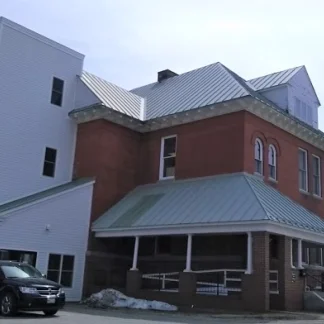Community Health and Counseling - Skowhegan
Community Health and Counseling – Skowhegan is a private rehab located in Skowhe...
Maine Behavioral Health Organization - Leavitt Street offers outpatient treatment for individuals with alcohol and/or substance addiction. The program includes individual counseling, family therapy, case management and more. Maine Behavioral Health Organization - Leavitt Street is located at Skowhegan, Maine.
Maine Behavioral Health Organization – Leavitt Street’s mission is to provide evidence-based services leading to increased quality of life through research, advocacy, education, operated services, and participation in public behavioral health policy design. They believe that by observing and analyzing functional relationships they can build an environment to support your needs.
As they catalyze change, based off of what they know works, together they can grow by building healthy positive relationships that are meaningful, stronger, and lifelong.
They were incorporated as a non-profit organization in March 2011 and received their state license to provide mental health services the following month.
Contact us for more information: (207) 542-4301

Connect with Maine Behavioral Health Organization - Leavitt Street by calling their admissions team directly.
(207) 542-4301 Website Get DirectionsCognitive Behavioral Therapy (CBT) is a therapy modality that focuses on the relationship between one's thoughts, feelings, and behaviors. It is used to establish and allow for healthy responses to thoughts and feelings (instead of unhealthy responses, like using drugs or alcohol). CBT has been proven effective for recovering addicts of all kinds, and is used to strengthen a patient's own self-awareness and ability to self-regulate. CBT allows individuals to monitor their own emotional state, become more adept at communicating with others, and manage stress without needing to engage in substance abuse.
Research clearly demonstrates that recovery is far more successful and sustainable when loved ones like family members participate in rehab and substance abuse treatment. Genetic factors may be at play when it comes to drug and alcohol addiction, as well as mental health issues. Family dynamics often play a critical role in addiction triggers, and if properly educated, family members can be a strong source of support when it comes to rehabilitation.
Group therapy is any therapeutic work that happens in a group (not one-on-one). There are a number of different group therapy modalities, including support groups, experiential therapy, psycho-education, and more. Group therapy involves treatment as well as processing interaction between group members.
In individual therapy, a patient meets one-on-one with a trained psychologist or counselor. Therapy is a pivotal part of effective substance abuse treatment, as it often covers root causes of addiction, including challenges faced by the patient in their social, family, and work/school life.
Research clearly demonstrates that recovery is far more successful and sustainable when loved ones like family members participate in rehab and substance abuse treatment. Genetic factors may be at play when it comes to drug and alcohol addiction, as well as mental health issues. Family dynamics often play a critical role in addiction triggers, and if properly educated, family members can be a strong source of support when it comes to rehabilitation.
Group therapy is any therapeutic work that happens in a group (not one-on-one). There are a number of different group therapy modalities, including support groups, experiential therapy, psycho-education, and more. Group therapy involves treatment as well as processing interaction between group members.
In individual therapy, a patient meets one-on-one with a trained psychologist or counselor. Therapy is a pivotal part of effective substance abuse treatment, as it often covers root causes of addiction, including challenges faced by the patient in their social, family, and work/school life.
Group therapy is any therapeutic work that happens in a group (not one-on-one). There are a number of different group therapy modalities, including support groups, experiential therapy, psycho-education, and more. Group therapy involves treatment as well as processing interaction between group members.
In individual therapy, a patient meets one-on-one with a trained psychologist or counselor. Therapy is a pivotal part of effective substance abuse treatment, as it often covers root causes of addiction, including challenges faced by the patient in their social, family, and work/school life.
In individual therapy, a patient meets one-on-one with a trained psychologist or counselor. Therapy is a pivotal part of effective substance abuse treatment, as it often covers root causes of addiction, including challenges faced by the patient in their social, family, and work/school life.
Community Health and Counseling – Skowhegan is a private rehab located in Skowhe...
Kennebec Behavioral Health - Wilson Place is a Residential Supported Housing Pro...
Crisis and Counseling Centers is a private rehab located in Skowhegan, Maine. Cr...
Kennebec Behavioral Health, located in Skowhegan, Maine, offers alcohol and drug...